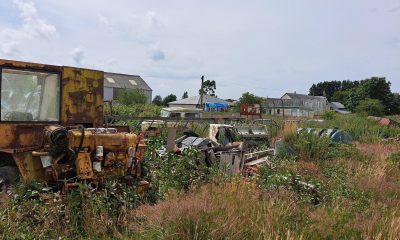Farming
Farmers fuming as First Minister calls Sustainable Farming Scheme ‘a bargain’

- First Minister ‘patronising’ rural Wales: Plaid’s Llyr Gruffydd hits out at First Minister
- Welsh farmers could mirror European protests
- Local MS will stand “shoulder-to-shoulder” with farmers if they protest
AS ANGER at the Welsh Government rises across rural Wales, farming union leaders met with Rural Affairs Minister Lesley Griffiths this Monday (Feb 19).
The meeting came after fierce criticism of the Welsh Government’s approach to rural policy, including the proposed Sustainable Farming Scheme.
With frustration and resentment at boiling point in rural communities, the talks were the best hope of achieving a compromise between the Welsh Government and Wales’s farmers – or at least calming down the febrile atmosphere in which mass protests seem inevitable.
UNIONS CALL FOR WELSH GOVERNMENT TO ‘WORK WITH THEM’
After the meeting, FUW President Ian Rickman called for cooperation and partnership.
“As farmers, we understand our members’ current strength of feeling and frustration.
“We expressed these deep concerns and the resentment felt by our members and the wider rural community to the Minister in no uncertain terms today.
“We have called for an independent assessment to take place on the socio-economic impact and bureaucratic burden of Welsh Government agricultural policies, to include the SFS, bovine TB and the Control of Agricultural Pollution ‘NVZ’ regulations.
“This time must also be used for a series of regular meetings involving the Minister for Rural Affairs and her officials with both farming unions to rethink the proposals through genuine co-design.”
NFU Cymru President Aled Jones hailed the talks as constructive but stressed the urgency of working together to stabilise the rural economy and plan for the future.
“We have asked the Welsh Government to undertake a socio-economic assessment of the SFS that assesses the impact of the current proposals on Welsh farming, rural communities and the supply chain.
“No decisions on the next steps for the SFS should be taken until that assessment is complete.
“If necessary, the SFS should be paused and delayed until we can be sure that the SFS can deliver the same level of stability to the whole agri-food supply chain and rural Wales as the current support arrangements.
“The current pressures go beyond the SFS. Therefore, I have asked the Minister to consider establishing an Independent Review Group to consider the cumulative burden of regulations and policies on Welsh farming businesses. That process must also consider the wider economic and political factors affecting the Welsh agricultural industry at this time.
“The meeting was constructive, and I was pleased that the Minister listened to our concerns and recommendations to the Government.
“I now look to her and the Welsh Government to take forward our proposals.
“I have asked the Minister to commit to a series of meetings to ensure that moving forward, the design of the SFS and the payment rates attached to it can be a genuine co-design between Welsh Farming and Welsh Government.”
Promising words. But there was no statement from the Minister on the talks.
DIRE DRAKEFORD KILLS HOPE
It didn’t matter.
Shortly afterwards, Mark Drakeford torpedoed whatever good the meeting did at addressing farmers’ concerns.
He undermined any good work by Lesley Griffiths in a rant delivered during a press conference.
The First Minister’s tin-eared approach to rural policy and desire to play to urban and suburban voters spilt over under questioning.
Mr Drakeford ludicrously suggested that farmers wanted £300m of public money to spend as they please, with no strings attached.
Nobody is suggesting that, as the First Minister knows.
It appears that in the home straight of his time in power, Mr Drakeford has ditched the “doctor’s persona” and shown his ideology-driven, partisan, and intolerant real one.
The warm words of farmers’ leaders turned to ashes in their mouths as the extent of the First Minister’s ignorance became apparent.
Why the First Minister cannot just come out and say he and his Government regard rural Wales with contempt is a matter for him. However, in a General Election year, it’s not too much to suppose that Labour candidates hoping to win rural seats on the back of UK-wide polls will be troubled by his cack-handedness.
The following day, Mr Drakeford dug in.
At First Minister’s questions, he told Conservative Leader Andrew RT Davies: “There is a bargain here. That is the bargain that the sustainable farming scheme represents. It’s why we’ve had a seven-year conversation with farmers in Wales about getting that bargain right.”
Which rather begs questions about future funding and why so much of the consultation is uncosted or data-deficient.
That was not the First Minister’s biggest misstep.
Besides blaming farmers for Brexit, a trope so tired that even the most loyal party hacks must groan whenever he trots it out, Mr Drakeford further undermined Lesley Griffiths.
Since the Welsh Government published its financial analysis showing the disastrous consequences of the Sustainable Farming Scheme, the Rural Affairs Minister has backed and filled by claiming the figures are outdated and subject to revision.
Not according to the First Minister.
Mr Drakeford said the figures published would inform the consultation.
If the figures are outdated or redundant, it is hard to see the value of such data or how they can inform anything.
As things stand, and the First Minister refused to answer when pressed, Wales faces a huge hit to the nation’s economy, armageddon for the rural economy, and job losses at twice the scale of Port Talbot in areas where jobs are hardest to replace.
OPPOSITION SLATE FIRST MINISTER
Andrew RT Davies MS, Leader of the Welsh Conservatives, said: “Labour’s plans for agriculture would be ruinous for so many farmers, and would dissolve rural businesses that have been providing food and looking after our countryside for generations, hardly a ‘bargain’.
“Labour must scrap this policy, which amounts to green blackmail, before they do irreversible damage to our farming communities.”
Local MS Sam Kurtz, the Shadow Rural Affairs Minister, added: “The start of the next First Minister’s tenure could be overshadowed by serious discontent in rural Wales, as neither candidate is willing to listen to the genuine concerns of the agricultural sector.
“That’s why I’m urging once again for the consultation to be paused. If it isn’t then it is only a matter of time before farmers are on the steps of the Senedd protesting, and I will be standing shoulder to shoulder with them.”
Plaid Cymru spokesperson for Rural Affairs, Llyr Gruffydd MS, said: “The First Minister’s comments show yet again how out of touch Labour are with our farmers and rural communities across Wales.
“Instead of patronising the sector, the First Minister and his Government should work with the community to show that their voices and concerns are being listened to.
“This kind of outburst will only deepen the despair felt by so many in the industry, adding to the mental health crisis that’s now emerging in so many farming communities.
“Nobody knows more than farmers that they have a big part to play in helping tackle the climate emergency. That’s why the industry has pledged to achieve net zero by 2040, earlier than the Welsh Government’s target.
“Farmers stand ready to meet the challenge, but that transition has to be a just transition for those working in agriculture in the same way as it has rightly been demanded for other sectors such as the steel industry.
“Plaid Cymru has argued time and time again that investing in our farming industry is an investment for Wales, with a return of £9 for every £1 that goes into the industry.
“From the economy to producing food, safeguarding our culture and language, and being a key partner in tackling climate change – Labour must realise that Welsh farmers are vital to Wales’s success.”
Farming
E-Tickets now on sale for Pembrokeshire County Show 2024

E-TICKETS are now on sale for this summer’s Pembrokeshire County Show, the largest county agricultural show in Wales. Preparations are coming together well for what is set to be a fantastic two days of livestock, competitions, attractions and much more.
General entry tickets for the show, taking place on Wednesday and Thursday, 14 & 15 August, are now available at an ‘early birds’ rate online from the website. Ticket prices have had to increase slightly to cover costs but still remain below 2019 charges. The early bird rate for Adults is £15, children £8 (5-16 years), Carers as well as children four years and under are free. Please visit: www.pembsshow.org to purchase your e-tickets.
Adam Thorne, President of Pembrokeshire Agricultural Society said, “At the event in August visitors will be able to tickle their tastebuds in the Castell Howell Food Hall, marvel at the livestock classes, enjoy watching the dog agility, be wowed by the showjumping, explore the horticulture, arts and crafts entries.
Shop ‘til they drop in the Country Market area, which will showcase over 40 quality local and award winning product and craft stalls and much more.”
Pembrokeshire Agricultural Society Membership packages are also available and these include admission to the Show and the Members’ Area. Purchasing membership of the society will support its aim to promote, advance and improve agriculture, horticulture and rural crafts and skills by the improvement of livestock and the demonstration and showing of livestock, machinery, crafts, products, methods and processes connected with agriculture and agricultural education in particular by the holding of an annual show. Full details are available on the website: Become A Member | Pembrokeshire County Show | Pembs Agricultural Society (pembsshow.org)
Putting together this event is hard work and requires an enormous effort by the staff, volunteers and trustees of Pembrokeshire Agricultural Society. The Society is indebted to so many for their commitment and support in helping host the event.
A special mention must go to the county show sponsors. Pembrokeshire Agricultural Society is proud to have many local, regular, sponsors who make the event possible.
Sponsorship Director, Richard Cole, said, “Sponsorship and Pembrokeshire County Show have been a successful combination for the last 45 years. Sponsors have enjoyed promoting their businesses through the varied mediums of banners, announcements, show rings, buildings, equine and livestock classes and championships over the years. It isn’t too late. If you’d like to discuss becoming a corporate sponsor please complete the form on our website: www.pembsshow.org.”
Farming
Pembrokeshire Agricultural Society in search for county’s top progressive farmers

IF you farm in Pembrokeshire and can demonstrate your farm’s use of the latest technological methods to promote progressive, sustainable agriculture then the Pembrokeshire Agricultural Society encourage you to enter the prestigious Baron de Rutzen Award.
Adam Thorne, Pembrokeshire County Show President, said, “We are looking for local Pembrokeshire farmers, under the age of 45, who can demonstrate their farm’s use of the latest technological methods to promote progressive, sustainable agriculture. They also need to show consideration for the environment and habitat sensitivity on their farm as well as present an aesthetically pleasing example of farming in the county. The competition welcomes all livestock and arable sectors to take part.”
Last year’s winners of the Award were Mark and Caroline Davies of Little Newcastle, Haverfordwest. They milk 230 pedigree Holsteins through a fully automated system. They rear their own replacements and also have a small beef enterprise. The farm is all grassland and they follow a strict reseeding and liming policy to optimise the yield from their multi-cut silage system. The couple place significant emphasis on animal health, husbandry and breeding to maximise the efficiency of their system.
Baron John Fredrick De Rutzen was President of Pembrokeshire Agricultural Society in 1936 and the Baron de Rutzen Trophy was produced in his memory. The third Baron served in the Welsh Guards and tragically died, aged 36, in 1944.
This year’s entrants must be fully practising farmers within the county of Pembrokeshire and were under the age of 45 years on 1 January 2024. Entries can either be by nomination or direct application online on the Pembrokeshire Agricultural Society website. Click here to apply: Baron de Rutzen Award | Pembrokeshire County Show | Pembs Agricultural Society (pembsshow.org)
The closing date for nominations and applications is at noon on Wednesday, 29 May 2024.
Farming
Pembrokeshire Agricultural Society elect new president

ARABLE and beef farmer, Adam Thorne, has been unanimously elected to become the new President of Pembrokeshire Agricultural Society for the year ahead. Adam is the third generation of his family to hold the position.
During the Annual General Meeting of Pembrokeshire Agricultural Society, held last week on the Pembrokeshire Showground, Mr Tim John and his wife Margaret John were also voted in as Presidents elect.
Adam Thorne has had a long association with Pembrokeshire Agricultural Society. After visiting the show as a toddler, then helping show the family’s pedigree Herefords, his uncle got him into helping him with stewarding in his early teens. From there he progressed to being a Steward with his own section, Commercial Cattle, and then also the Butcher’s Lambs section.
From stewarding, Adam became involved with committee work, starting as an Executive and then on to the former Finance and General Purposes Committee. He has been Chairman of the Estates Committee for 12 years and is now a Board member and a Trustee.
Adam said, “I am proud of my long association with Pembrokeshire Agricultural Society. I am the third generation to now be President, following my late grandfather, Walter Thorne, my father, Robert Thorne and more recently my uncle, George Thorne. I am looking forward to my year in the prestigious position.”
Away from his work with the society, Adam runs the family’s arable and beef farm in Robeston West, Milford Haven. He has been heavily involved with Tiers Cross YFC from an early age, having been Club Secretary twice and Chairman. He has also sat on Pembrokeshire County YFC Committees and the Wales YFC Rural Affairs Committee.
The 2024 Pembrokeshire Agricultural Society officeholders, announced at the AGM, include Miss Ffion Edwards who was awarded the role of Ambassador at last year’s show. Ffion, a nurse from Maenclochog, has enjoyed many years of attending the county show and believes that there are so many good elements to it. Ffion has been a member of Llysyfran YFC for 15 years and enjoys every aspect of young farmers – trying new experiences, competing and travelling to name a few. Mrs Nicola Owen was also elected as the Honorary Treasurer.
Brian Jones, the outgoing Pembrokeshire Agricultural Society President, took the opportunity to thank everyone who had helped and supported him throughout his presidency. During his year as President, Brian and his wife Helen, raised a tremendous amount of money for various charities including the Pembrokeshire Agricultural Society, RABI, Tir Dewi and the DPJ Foundation. Brian also gave his assurances that Castell Howell will continue to sponsor the Food Hall for future years.
Pembrokeshire County Show, the largest county agricultural show in Wales, will be held over two days again this summer on 14 and 15 August. Everyone is invited to attend the celebration of rural life in the county.
Pictured (left to right): Ffion Edwards the Ambassador for 2024; Adam Thorne, President; Margaret and Tim John, the Presidents Elect.
-

 News4 days ago
News4 days agoPolice and air ambulances at ‘serious incident’ at West Wales school
-

 Business2 days ago
Business2 days agoLargest Welsh port appoints communications and marketing director
-

 Crime4 days ago
Crime4 days agoPembrokeshire pensioner accused of 17 sexual offences against children
-

 Crime3 days ago
Crime3 days agoAll three school stabbing victims discharged from hospital, police confirm
-

 Community5 days ago
Community5 days agoCounty Hall to offer space for community banking
-

 Crime6 days ago
Crime6 days agoBrian Davis: Wanted on suspicion of commercial burglary
-

 Sport6 days ago
Sport6 days agoSwifts eyes on double.
-

 Community2 days ago
Community2 days agoSuspected explosive device found on west Wales beach





















